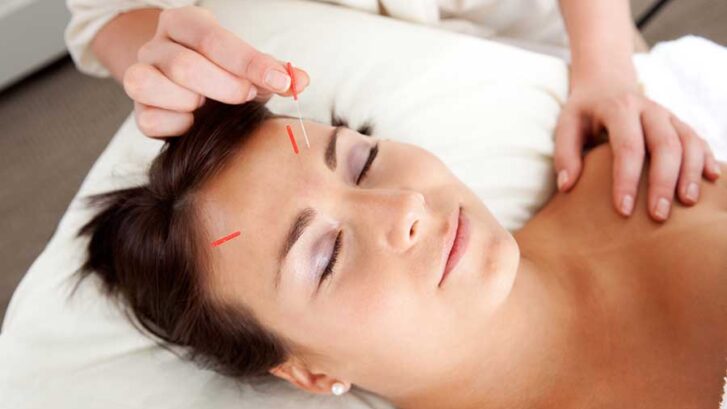Acupuncture Appears to Help with Pain Conditions
Once thought to be part of “woo-woo” hippie culture, acupuncture is increasingly making its way into mainstream medicine.
Our concierge doctors in Jupiter are especially interested in its potential to provide pain relief in place of potentially addictive opioids or other medications. And many recent studies, including one released just last month, continue to show promise in this area.
Going mainstream
As a recent Harvard Health blog put it, “Individual large-scale clinical studies have consistently demonstrated that acupuncture provided better pain relief compared with usual care.”
Contributors Helene Langevin, MD, and Carolyn A. Bernstein, MD, FAHS, explained that earlier studies were operating at a disadvantage due to the lack of valid placebo controls; that is, how to simulate acupuncture in sham treatments to rule out a possible placebo response.
“In order to address this concern, a 2012 meta-analysis combined data from roughly 18,000 individual patients in 23 high-quality randomized controlled trials of acupuncture for common pain conditions,” they wrote.
“This analysis conclusively demonstrated that acupuncture is superior to sham for low-back pain, headache, and osteoarthritis, and improvements seen were similar to that of other widely used non-opioid pain relievers.”
What is acupuncture?
Acupuncture is a technique in which trained practitioners insert tiny needles into the skin at various points on the body. A form of traditional Chinese medicine (TCM), it has been used there for at least 3,000 years.
It is said to:
- relieve most types of pain
- relieve insomnia
- reduce hot flashes associated with menopause
- relieve respiratory and seasonal disorders
- reduce pain and discomfort from chemotherapy
- relieve digestive disorders
- reduce high blood pressure
- relieve urinary and reproductive disorders
- reduce stress and anxiety, including post-traumatic stress disorder (PTSD)
- aid in addictions to nicotine, alcohol, and other drugs
- and treat many other conditions.
It is estimated that more than 10 million acupuncture treatments are provided annually in the U.S., and many insurance companies now cover the procedure. Medicare covers it for the treatment of low back pain. The World Health Organization (WHO) endorses it.
Even the Department of Veterans Affairs (VA) has trained 2,400 people to provide “battlefield acupuncture” for pain relief.
Latest study
Because so many people have offered anecdotal testimony to its effectiveness for pain relief, among other conditions, legitimate clinical studies are ongoing.
The U.S. National Institutes of Health (NIH) published a meta-study in 2012 which concluded: “Based on the results of our review, acupuncture appears to be effective for treating headaches and, although more research is needed, seems to be a promising treatment option for anxiety, sleep disturbances, depression, and chronic pain. It does not, however, demonstrate any substantial treatment benefit for substance abuse.”
The study also noted that no studies on PTSD or sexual functions were included in the review.
One of the most recent studies, published last month in the journal of the American Academy of Neurology, found that after two months of acupuncture treatment, subjects found relief from chronic tension-type headaches for at least eight months.
A team led by Ying Li, professor at Chengdu University of Traditional Chinese Medicine, studied the effect of a true acupuncture treatment—achieved by placing and moving a needle 12.5 to 20 millimeters deep in the body—to achieve a “deqi” sensation of tingling, numbness, or heavy feeling in the body, vs. a sham procedure in which needles were inserted only 2 millimeters deep.
At the end of the study, 68 percent of the 218 subjects, who had experienced tension-type headaches for 22 days a month over an average of 11 years, reported their number of headache days had been cut in half. By comparison, just 50 percent of those who received the sham procedure reported similar relief. Such results are typical in clinical trials of pain-relieving medications.
How does it work?
Achieving the “deqi” sensation is key, Li told CNN.
“The care providers should try their best to achieve deqi sensation at each acupuncture point,” he wrote in an email.
And yet, even someone as experienced as Li is unsure of exactly how acupuncture works.
“The mechanisms of how acupuncture provides sustained relief of headaches is unclear,” he told the network.
Other Chinese practitioners of acupuncture say it works by relieving blockages in what is known as the “life force” (known as “qi” or “chi”—pronounced “chee”) and improving this energy flow throughout the body. The qi is thought to flow along specific pathways (“meridians”) in the body which, when stimulated by the acupuncture needles, then becomes balanced.
Many Western doctors believe the traditional acupuncture points are actually muscles, nerves, and connective tissue that benefit from this type of stimulation to release endorphins—the body’s natural painkillers—in much the same way that massage does.
Is it safe?
If done correctly, there is usually very little sensation involved when the needles are inserted, although some people do report some slight discomfort.
The Mayo Clinic reports, “The risks of acupuncture are low if you have a competent, certified practitioner using sterile needles.”
However, those who have a bleeding disorder, women who are pregnant (acupuncture may induce premature labor), or anyone with a pacemaker should avoid acupuncture, it says.
According to the NIH, “Acupuncture is generally considered safe when performed by an experienced, well-trained practitioner using sterile needles. Improperly performed acupuncture can cause serious side effects.”
It also recommends checking the acupuncturist’s credentials, asking about the number of treatments that will be needed, and the cost of each treatment.

